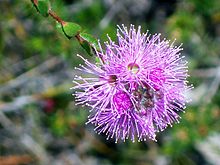Kunzea capitata
| Kunzea capitata | |
|---|---|
 |
|
| Ku-ring-gai Chase National Park, Australia | |
| Scientific classification | |
| Kingdom: | Plantae |
| (unranked): | Angiosperms |
| (unranked): | Eudicots |
| (unranked): | Rosids |
| Order: | Myrtales |
| Family: | Myrtaceae |
| Genus: | Kunzea |
| Species: | K. capitata |
| Binomial name | |
|
Kunzea capitata (Sm.) Heynh. |
|
| Synonyms | |
|
Metrosideros capitata Sm. |
|
Metrosideros capitata Sm.
Kunzea capitata is a shrub species in the family Myrtaceae. It is native to New South Wales in Australia.
The species has a spreading or erect habit and may grow up to 2 metres (6 ft 7 in) in height, but is usually within the range of 0.5–1 metre (1 ft 8 in–3 ft 3 in). Flowers are pink to purple, or occasionally white. These are produced on the branch ends in "heads". Leaves are 3.5–9 millimetres (0.14–0.35 in) long and 1.5–4.5 millimetres (0.059–0.177 in) wide, with recurved tips and 1 millimetre (0.039 in) long petioles.
The species was first formally described by English botanist James Smith in 1797 in Transactions of the Linnean Society of London, and given the name Metrosideos capitata. The species epithet capitata is derived from the Latin word caput (head), alluding to the arrangement of the flowers.
It was transferred to the genus Kunzea in 1846 by German botanist Gustav Heynhold.
The species occurs in heathland and dry sclerophyll forest from the Ulladulla district northward to Richmond River.
The species prefers a moist soil in a lightly shaded to sunny position. It is readily propagated by either seed or cuttings.
...
Wikipedia
